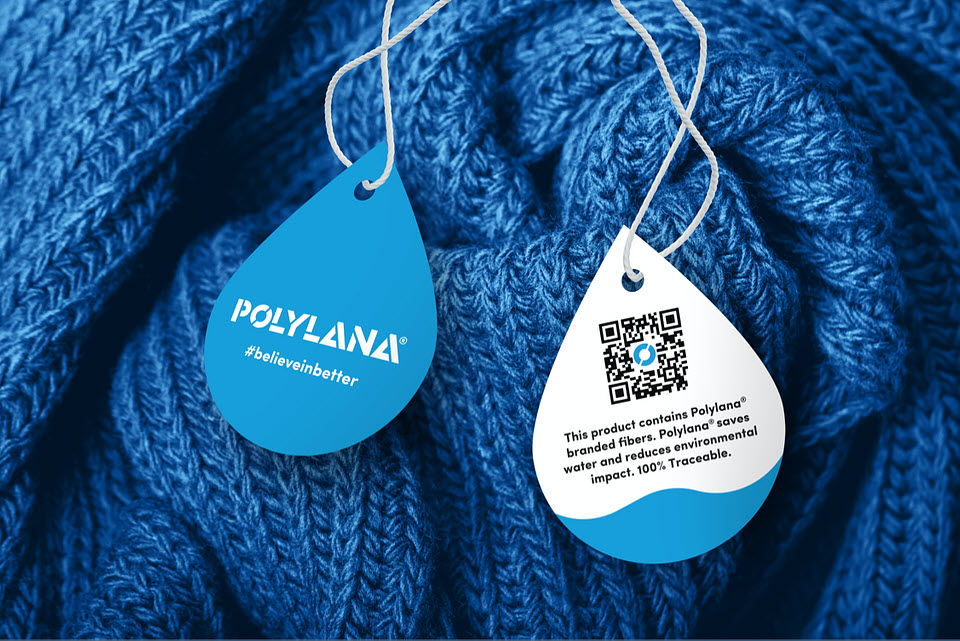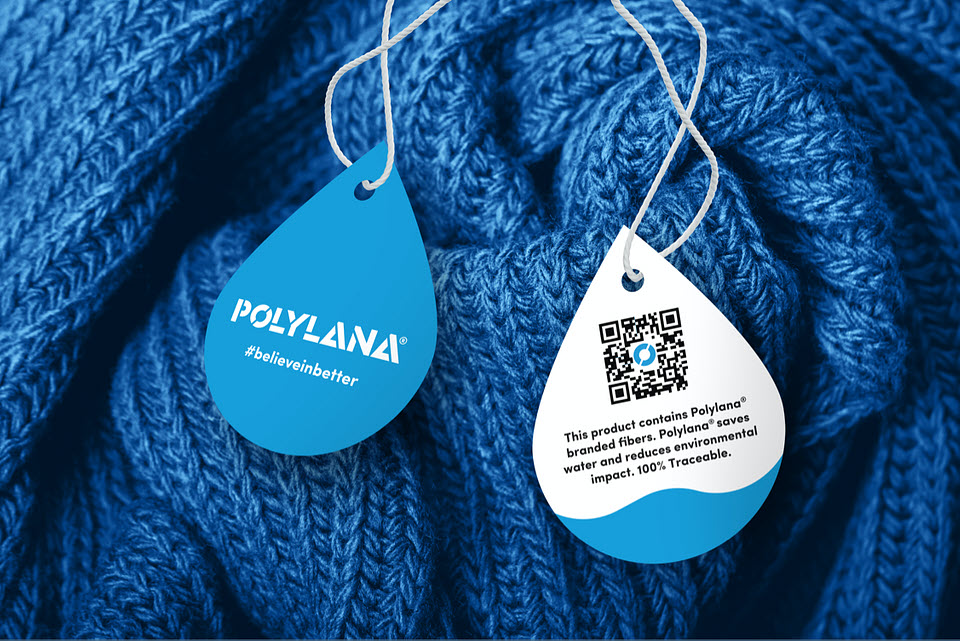
Polylana Fiber offers ‘starting point’ for sustainable knitting
By Fiona Haran
Polylana® Fiber is a low-impact alternative to 100% acrylic and wool fibre, using less energy, water and CO2 during production. Brand director Tatiana Ponce explains more to Fiona Haran.
The fast fashion era has been fuelled by synthetic fibres like acrylic, nylon and polyester – primarily due to their low cost and accessibility. But in order to disrupt this movement, brands are now realising that steps, no matter how small, must be taken to reduce their environmental impact. And as we all know, change can’t be achieved in isolation – it requires an industry-wide effort.
Knitwear brands especially are looking to make better choices when it comes to raw materials, opting for eco-efficient fibres that can save on vital resources and waste. For that reason, The Movement has developed Polylana Fiber – a low-impact alternative to 100% acrylic and wool fibre but with the same hand-feel and characteristics.
Behind it is Feico van der Veen, who in 2015 set about finding a partner to bring his concept to life. At that time, he was the owner and CEO of a Dutch trading company developing fashion accessories for large brands and retailers, such as knitted beanies and scarves. He investigated sustainable materials in line with retailers and brands’ environmental goals, but many of the low-impact solutions he found were non-transparent, not scalable and expensive.
After many months of research and failed testing, Polylana Fiber was created. In 2017, fashion accessories made from Polylana Yarn were introduced to some large fashion retailers, with end users including H&M, Zara, New Era and Lindex, to name a few.
According to Tatiana Ponce, Polylana Fiber’s brand director, these companies were previously using a lot of acrylic in their collections and wanted to reduce this usage by switching to recycled fabrics, with recycled polyester being the primary target.
“But by simply using recycled polyester to replace acrylic, you miss the hand-feel and the loft of acrylic,” says Ponce.
“Polylana Fiber can achieve this perfectly. It has the same hand-feel and look as acrylic but with lower impact. It’s not just different, but better.”
Polylana Fiber is comprised of 50% recycled polyester and 50% modified polyester. It can be spun like recycled polyester, but the dyeing process is what sets it apart. “Polylana Fiber dyes the same as acrylic,” adds Ponce. “For instance, the temperature usage is lower reducing energy emissions and bringing better overall performance than the polyester dyeing process.”
To compare the impact of Polylana Fiber versus acrylic fibre, The Movement worked closely with Textile Exchange, a global non-profit membership body for the sustainable fibres and materials industry. Based on LCA data for Polylana versus acrylic per one kilo undyed fibre, Polylana was found to use 76% less energy, 85% less water, 76% less waste, 19% less CO2, and 32% less fibre release during wash cycles.
That said, Polylana is still one-part virgin material. So, to improve its sustainable offering, Ponce says that by 2023, the aim is to adjust this ratio to 90% recycled polyester and 10% virgin material, adding that it has already made progress in this area.
Growing awareness
The other primary aspect that Ponce would like to stress is traceability. Through The Movement’s AWARE Integrity System, Polylana Fiber can be identified in the final product, even after the knitting process.
Each production of Polylana Fiber and the final knitted products made from Polylana Yarn contains AWARE tracer particles and is registered on the AWARE blockchain to verify authenticity of Polylana Fiber and to validate impact claims, certification and composition.
“The AWARE platform is important as everyone is worried about greenwashing at the moment,” says Ponce. “Consumers want to make better choices. I think the world is becoming a little stressed out with being sustainable – what does it mean to be sustainable? This is a question we ask a lot. It’s not yet clear what is sustainable and what isn’t, as not everything that is recycled is sustainable.”
Market reach
Polylana can be spun with various fibres including cotton, wool, viscose, nylon and acrylic to enhance sustainability, functionality and/or aesthetics. Plus, it targets multiple applications including fashion, outdoor, sports, merchandising and gifts, and home textiles.
The fibre was originally only available in China, but since the Covid-19 pandemic – and the sourcing issues it presented – the brand made the decision to extend its global reach. In January this year, DBT Fibre Italy became Europe’s first official distributor and convertor of Polylana eco-efficient knitting fibre tops. The objective was to accelerate the use of low-impact and traceable fibres for the European fashion & textile market.
“For us, 2020 was a very important year,” says Ponce. “Despite the initial disruption to our plans, we saw it as fantastic as we had time to think. The demand pushed up to move to the right place. We didn’t think of partnering with an Italian company last year, it was not on our radar, but we closed the deal in September.
“DBT are convertors of tow fibre to top fibre. For us, DBT is important as it means that we are going to introduce Polylana top fibre in Europe,” she continues. “All the production of Polylana was previously done in China, including staple and top. And now, we are producing top fibre in Italy. Thanks to our collaboration with DBT Fibre, knitters in Europe can have easy access to Polylana Fiber and Polylana blended yarns.”
This also means closer cooperation with major European brands: “DBT is very professional, it’s important to have such a strong partner because it gives us two things: it produces in Europe for us where the big brands are, such as PVH and Calvin Klein. [These brands] are moving to Polylana but they don’t want to produce in Asia. So, we are super happy that we are now partnering with DBT.”
To learn more about Polylana Fiber, visit https://polylana-fiber.com
Have your say. Join the conversation and follow us on LinkedIn






